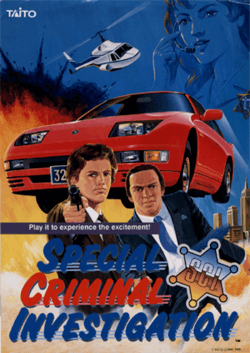Special Criminal Investigation
| Special Criminal Investigation | |
|---|---|
 North American Special Criminal Investigation arcade flyer. | |
| Developer(s) | Taito |
| Publisher(s) | Taito |
| Series | Chase |
| Platform(s) | Arcade, Amiga, Amstrad CPC, Atari ST, Commodore 64, MS-DOS, Sega Master System, PC Engine, ZX Spectrum |
| Release | 1989 |
| Genre(s) | Racing game, Action game |
| Mode(s) | Single-player |
| Cabinet | Upright, sit-down |
| Display | Raster, standard resolution |
Special Criminal Investigation, also known simply as S.C.I. and Chase HQ II: Special Criminal Investigation in some versions of the home ports, is a 1989 arcade game published by Taito and is the sequel to the 1988 original Chase H.Q..
Brief info

Instead of the black Porsche 928 of the first game, the player commands a red example of the just-introduced (at the time) Nissan 300ZX Z32 T-Top Turbo. Unlike the first game, the player was able to fire at offending vehicles, with some cabinets containing buttons on the steering wheel, and others having a fire button on the gearshift, along with a button to activate the nitrous boost.
The game brings back protagonists Tony Gibson and Det. Raymond Broady of the first game, and their second game appearance. Broady has taken over the driver's seat this time, while Gibson, as the passenger, serves as the gunman (Chase H.Q. (1988) the Game appeared to be overshadowed).
Ports and related releases
Conversions for Amiga, Atari ST, PC, Commodore 64 and ZX Spectrum were released in 1991 by Ocean Software, developed by Glasgow's ICE Software. A conversion for the PC Engine (TurboGrafx-16) was released in January 1991 exclusively in Japan by Taito. Natsume ported it to the Sega Master System.
Reception
| Reception | ||||||||||||||||||||
|---|---|---|---|---|---|---|---|---|---|---|---|---|---|---|---|---|---|---|---|---|
| ||||||||||||||||||||
References
- ↑ https://archive.org/stream/computer-video-games-magazine-113/CVG113_Apr_1991#page/n78/mode/1up
- ↑ http://amr.abime.net/review_27120
- ↑ http://amr.abime.net/review_27121
- ↑ http://www.solvalou.com/subpage/arcade_reviews/124/322/special_criminal_investigations_review.html
- ↑ http://www.solvalou.com/subpage/arcade_reviews/69/322/special_criminal_investigations_review.html
- ↑ Your Sinclair, issue 63
- ↑ http://www.solvalou.com/subpage/arcade_reviews/46/322/special_criminal_investigations_review.html
- ↑ http://www.solvalou.com/subpage/arcade_reviews/287/322/special_criminal_investigations_review.html
- ↑ http://amr.abime.net/review_8934
- ↑ https://archive.org/stream/zero-magazine-04/Zero_04_Feb_1990#page/n90/mode/1up
- ↑ http://amr.abime.net/review_40279
- ↑ http://amr.abime.net/review_40280
- ↑ https://archive.org/stream/RAZE_Issue_09_1991-07_Newsfield_Publishing_GB#page/n57/mode/1up
- ↑ http://amr.abime.net/review_5594
- ↑ http://amr.abime.net/review_5593
External links
- Chase H.Q. II: Special Criminal Investigation at SpectrumComputing.co.uk